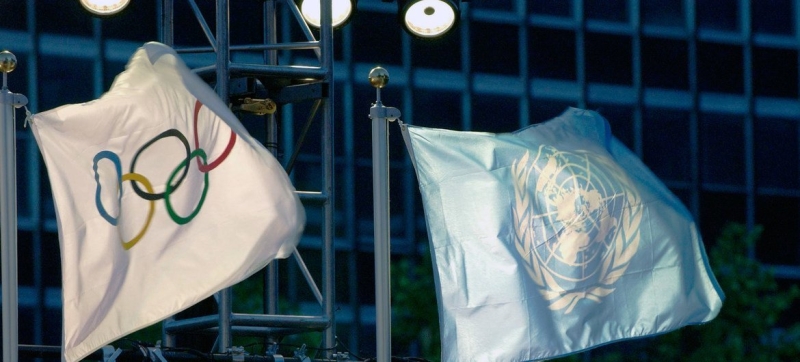
Olympic flag and UN flag. UN human rights chief ahead of Olympics: sport challenges stereotypes Human Rights
Every few years, the Olympic and Paralympic Games capture the imagination of people around the world. Athletes from different countries perform to the limit, demonstrating the full range of emotions from delight to despair, as well as showing remarkable endurance and perseverance. UN chief human rights activist Volker Türk stated this today at the 56th session of the Human Rights Council.
The games often take place against a backdrop of geopolitical tension and conflict. And this year is no exception, noted the High Commissioner for Human Rights.
Olympic Truce
The Olympic Games start in Paris on July 26 and will continue until August 11. According to established tradition, each time before the start of the Games, the United Nations calls on all states to observe the Olympic Truce, starting seven days before the opening of the Games and maintaining a ceasefire until the seventh day after their closure.
“This is in line with one of the fundamental aspirations of the Olympic Movement – to promote a culture of peace,” said Türk.
He noted that sport, like human rights, is the “common language of mankind”. It promotes fairness, mutual respect, inclusion and equal opportunity for all.
“The scale of major sporting events such as the World Cup, the Olympic and Paralympic Games is enormous. They bring together people from all corners of the world. They can challenge stereotypes and celebrate the extraordinary human spirit,” Türk said.
Problems in the World of Sports
However, the world of sports is not immune to human rights issues, including when organizing major events.
Türk recalled such phenomena as abuse and corruption, racism and sexism, violence against women, discrimination based on religion, religious dress or gender identity.
Transgender and intersex women often face discrimination in sports, and they have virtually nowhere to turn for legal protection, stressed Turk.
Progress and problem solving
Significant progress has been made in the sports world recently, the High Commissioner noted. Some businesses are aligning their practices with the UN Guiding Principles on Business and Human Rights.
Human rights policies and grievance mechanisms are increasingly being included in major sporting events.
“We have also seen some unprecedented actions against racism, such as the sentencing of soccer fans in Spain for racially abusing Vinicius Junior,” Turk said.& nbsp;
But much remains to be done to ensure full respect for human rights and inclusivity in sport, the High Commissioner stressed.
“States have the primary responsibility to address these issues comprehensively and proactively, ensure access to remedies, and prevent further violations,” Turk said.
“This includes zero tolerance of racism and all forms of discrimination in sport, including anti-Semitism and Islamophobia, and commitment to gender-inclusive policies and programs that support women’s empowerment,” he added.
Athletes are defenders of human rights
Türk also recalled the need to protect those shines a light on the “dark side of sports.” .
“This requires great courage and deserves respect,” Turk said. “When athletes use their voice to promote equality in sports, they are truly advocates for human rights.” They often speak out at great risk to themselves and their careers in a context that is not always open to criticism from within.”
He stressed that such athletes need to be supported and protected “so the same way we support human rights defenders.”
Read also:
